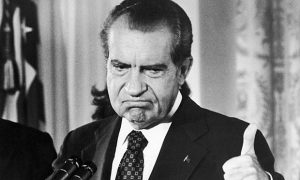Photo: moviepilot.com
Welcome back to our survey of the most Constitution-shredding, separation-of-powers-violating, James Madison-infuriating power grabs in presidential history. Last time, we covered the early presidents’ abominations, from blatant violations of the Bill of Rights to unauthorized military action against their fellow Americans. Now, we move into mid 19th century and beyond. Hold on kids, it only gets scarier from here:
- Abraham Lincoln— Suspension of Habeas Corpus
Looking back, most would excuse this one as the ends justifying the means. That doesn’t make it any less egregious. The greatest crisis in the history of the Republic was upon us, and the struggle to purge America’s “original sin” was underway. Abraham Lincoln, barely holding the nation together by the last few threads connecting the North and the recently seceded South, was desperate to keep the “border states” (slave states who hadn’t yet joined the Confederacy) from leaving the Union.
With potential secessionists in close proximity to the capital, Lincoln decided that a little thing like the Bill of Rights was more of a guideline than a set of hard and fast rules. He suspended the right of those arrested under suspicion of fomenting rebellion to claim habeas corpus, or the right to be imprisoned only for a legally valid reason. Long story short: if Lincoln didn’t like your face, it was the hoosegow for you, due process be damned. Even the Chief Justice of the Supreme Court told Lincoln that this was, to say the least, not cool. But Lincoln had a nation (to say nothing of human equality) to preserve.
- Andrew Johnson— Presidential Reconstruction
Lincoln paid the price for bringing the full force of the federal government down on Southern rebels and having the audacity to treat black people like human beings; he was assassinated. That made Vice President Andrew Johnson the first man to gain the presidency via murder rather than election. Thing was, Johnson was basically the anti-Lincoln. A Southerner, a former slave-owner, and an unapologetic racist, Johnson was bent on letting the post-Civil War South resemble the pre-Civil War South as closely as possible.
To whit, Johnson took advantage of a Congressional recess to do Reconstruction his way: pardoning Confederates and allowing white Southerners to resume business as usual, claiming that “This is a country for white men, and by God, as long as I am President, it shall be a government for white men.” When Congress returned, they fought to undo everything Johnson did while they were gone, overriding a record number of Presidential vetoes in their attempts to bring some shred of equality to the postwar nation.
Ultimately, Congress got so fed up with Johnson that they impeached him. He survived his trial, but finished the rest of Lincoln’s term quietly, stepping aside to let Congress run the show.
- Franklin Roosevelt, Japanese Internment
Following the attack on Pearl Harbor, FDR was ready to pull out all the stops and jump into World War II with both feet. Mostly, this was a good idea, but unfortunately Roosevelt decided that defeating our enemies meant trampling the rights of Americans in ways not seen since the Indian Wars of the late 1800’s.
Roosevelt ordered the rounding up and internment of Japanese Americans in certain…*ahem”…camps where they would be…um…concentrated for the safety of the nation. It didn’t exactly make sense; these were Japanese Americans after all, and most of those rounded up were from the mainland US, while the large population of Japanese in Hawaii was mostly left alone. At the end of the day, racism determined the policy rather than national security. Ultimately, an apology from the United States government was issued, along with over a billion dollars in reparations.
- Richard Nixon, The Watergate Scandal
The crown jewel of presidential scandals, Watergate remains the gold standard of Presidential misconduct. From secretly bugging the offices of his rivals, to using the FBI, CIA and IRS to harass and intimidate political activists, to finally sending a group of goons to break into the Democratic National Committee’s headquarters at the Watergate office complex, Tricky Dick is remembered mostly as a caricature of corruption. The scandal and ensuing investigations ended with Nixon’s resignation in the face of almost universal condemnation.
Faced with certain impeachment and removal from office, Nixon fled the coop, saved from legal prosecution only by a pardon from his former VP Gerald Ford. His legacy was swallowed by the incident, leaving him to be remembered mostly as the central figure in lists like this one.
- Ronald Reagan, The Iran-Contra Affair
After taking credit for the release of American hostages held by Iran during Jimmy Carter’s presidency (despite Carter officials having negotiated their release), The Gipper was poised as the ultimate tough guy on foreign policy. When Reagan found himself confronted with yet another hostage crisis involving Iran, however, his willingness to make less-than-scrupulous deals with terrorists became apparent.
The administration negotiated the release of Americans held by Iranian-backed militants in exchange for the sale of fancy weaponry, including deadly missiles, to Iran. The money from those sales was then diverted to right-wing “Contra” rebels in Nicaragua- despite Congress having cut support for those groups over their appalling abuses of human rights and gleeful use of terrorism. Cold Warrior that he was, Reagan was happy to skirt Congress in the name of fighting global communism, which the Contras helped oppose.
The scandal broke, and after months of investigation Reagan was forced to issue a televised apology for the deal, though he escaped legal consequences. They didn’t call him the “Teflon President” for nothing!
